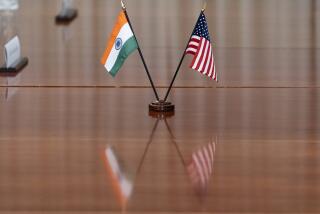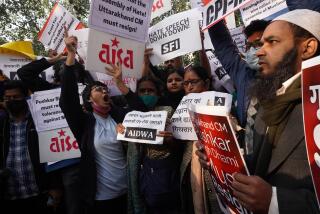INDIA : Grisly Slaying Puts Focus on Criminalized Politics
- Share via
NEW DELHI — The grisly murder has been dubbed India’s “crime of the decade” and the equivalent of the O.J. Simpson case. For many, it underlines in blood the ties between the nation’s politicians and criminals.
On July 2, police say, Sushil Sharma gunned down his wife, Naina Sahni, perhaps fearing she was cuckolding him. He tried to dispose of her body by incinerating it in his restaurant’s tandoor, the oven used for bread and other delicacies.
What made the crime leap into the headlines was Sharma’s political prominence. A former president of the Delhi Youth Congress, the ruling party’s potent youth organization, the strapping Sharma had a chance of being a candidate in next year’s parliamentary elections.
A Calcutta magazine characterized Sharma as “a trigger-happy thug who would pull out a gun at the slightest provocation.” And that, many say, is sadly typical of politics in the world’s largest democracy.
The report of a parliamentary committee made public this week outlined the rapid growth of criminal gangs, armed bands and drug and smuggling mafias with widespread contacts among officials. In certain states, such as Bihar, Haryana and Uttar Pradesh, gangs are said to enjoy the patronage of local politicians.
“Some political leaders become the leaders of these gangs/armed senas [bands], and over the years get elected themselves to local bodies, state assemblies and national Parliament,” one high-ranking law enforcement official told the committee.
Opposition parties delightedly used the Sharma case as ammunition against the ruling Congress (I) Party.
In his party’s defense, Prime Minister P.V. Narasimha Rao claimed that Congress wasn’t the only party with thugs and goons in its ranks. He implicitly threatened to make public the underworld links of other political groups, warning that “any party which wants to make the issue a stick to beat the Congress with will repent.”
Put embarrassingly on the defensive, Rao’s government created a committee to further probe crime-politician links.
C.P. Bhambhri, senior professor at the Center for Political Studies at Jawaharlal Nehru University, agrees that the criminalization of politics isn’t confined to a single party. It began more than a decade ago, Bhambhri said, when parties began resorting to thugs to terrorize the electorate into voting the “right” way.
Eventually, the professor said, some of the savvier goons became politicians themselves. These days, one Indian official has calculated, 180 of the 425 lawmakers in Uttar Pradesh, the country’s most populous state, have criminal records.
Sharma’s alleged conduct is “symptomatic” of a nationwide problem, Bhambhri said. As for the accused killer: Though police say he has admitted the crime, he denies it.
“I have not confessed,” a smiling Sharma told reporters last month. “It is all lies.”
More to Read
Sign up for Essential California
The most important California stories and recommendations in your inbox every morning.
You may occasionally receive promotional content from the Los Angeles Times.













